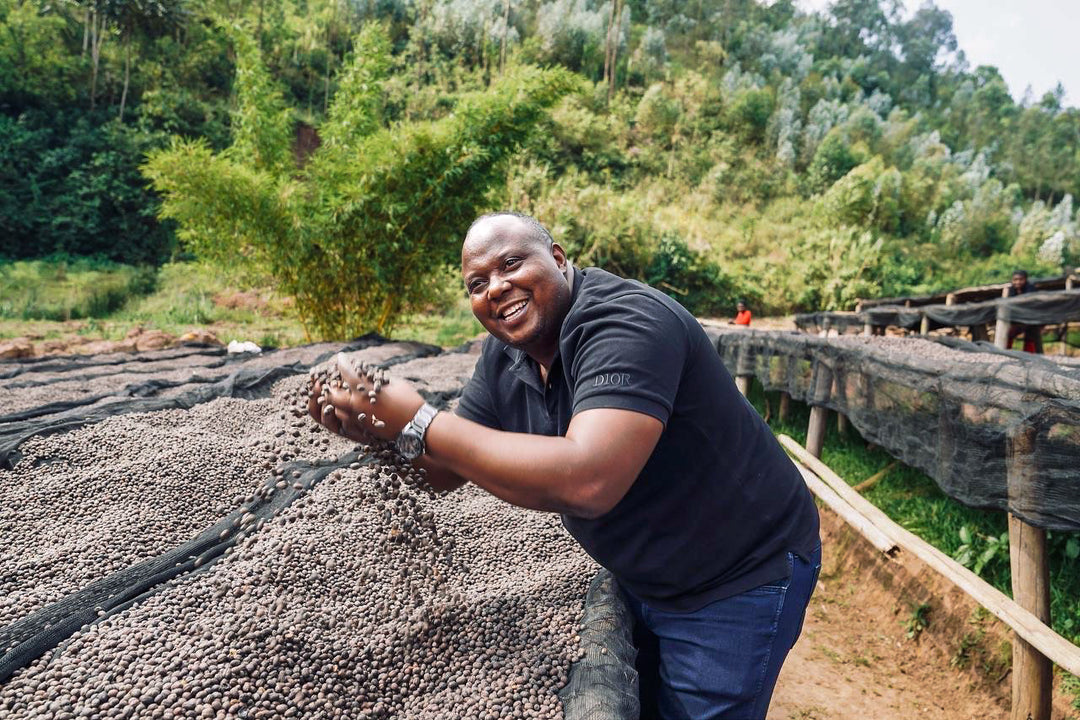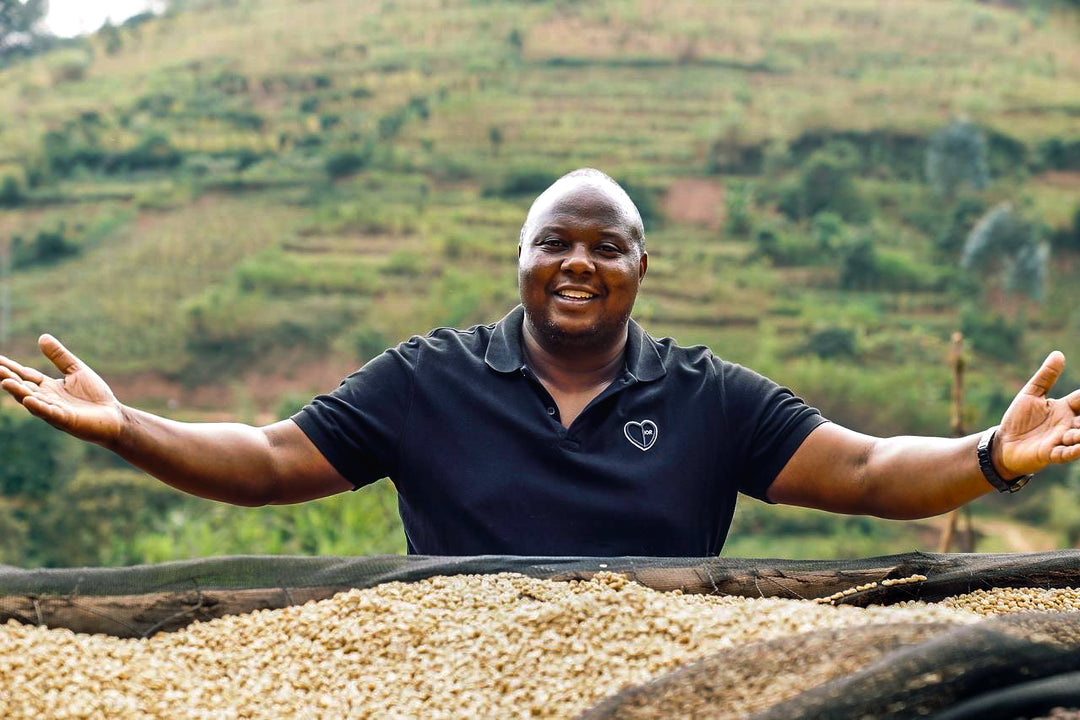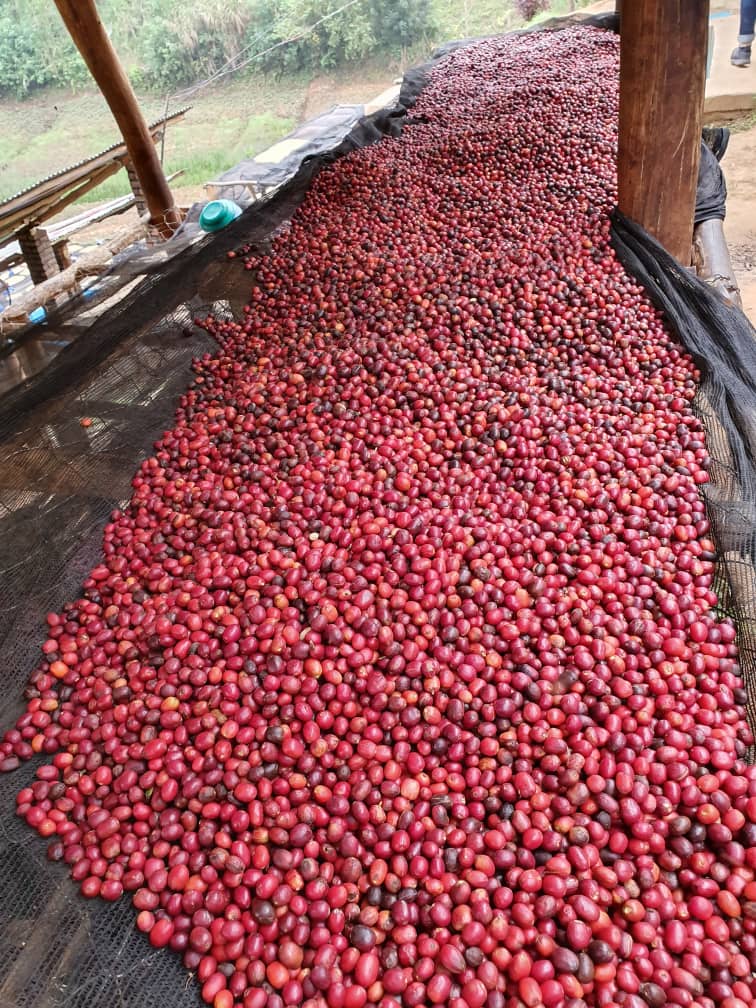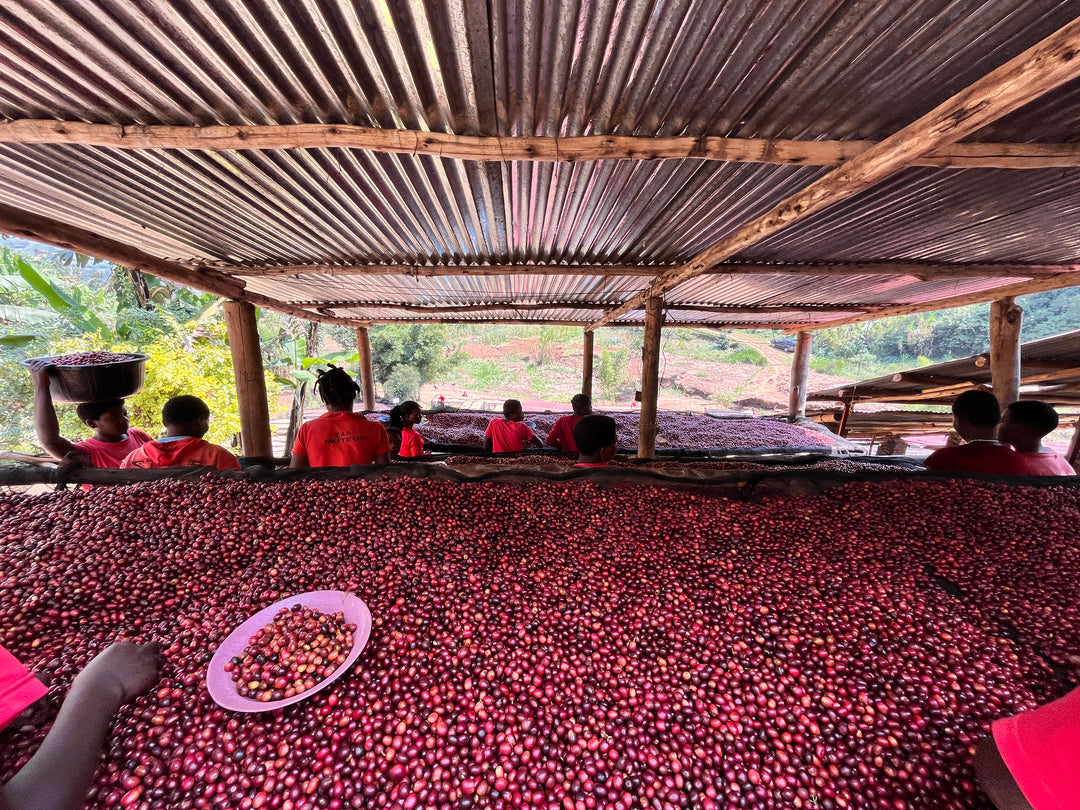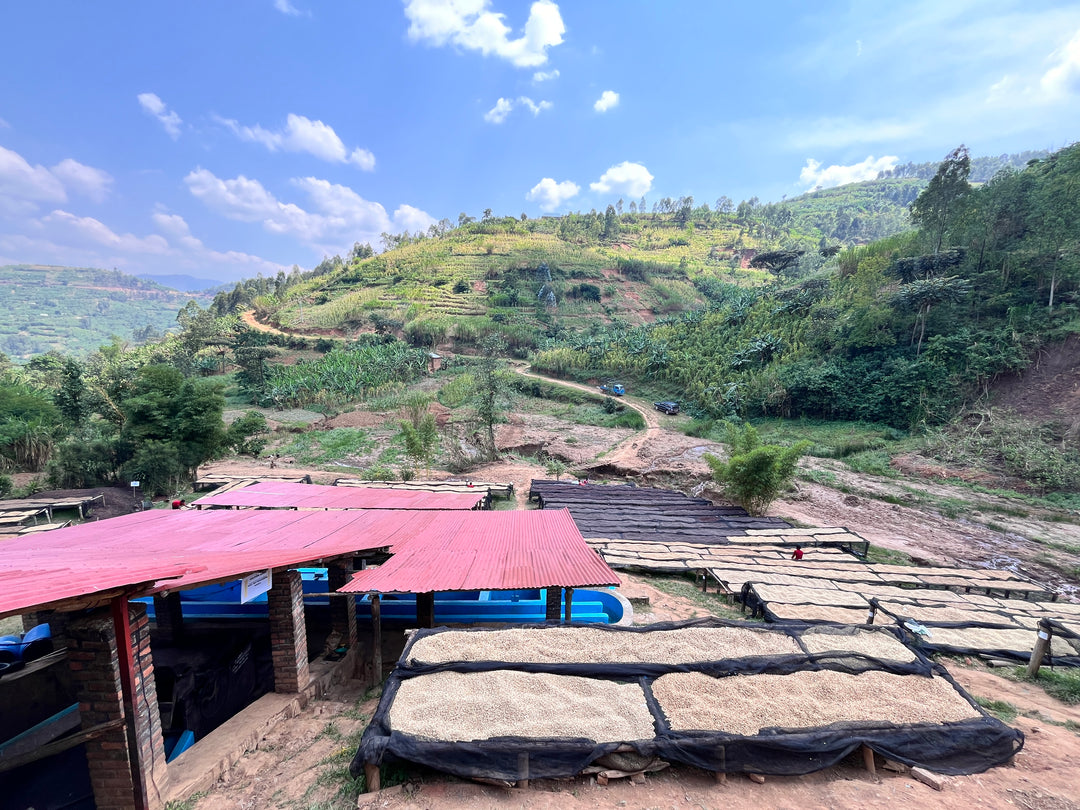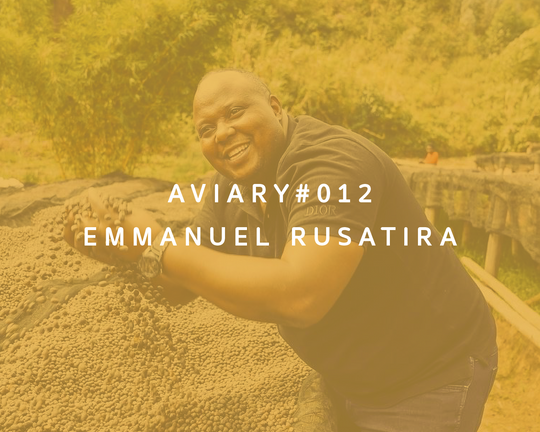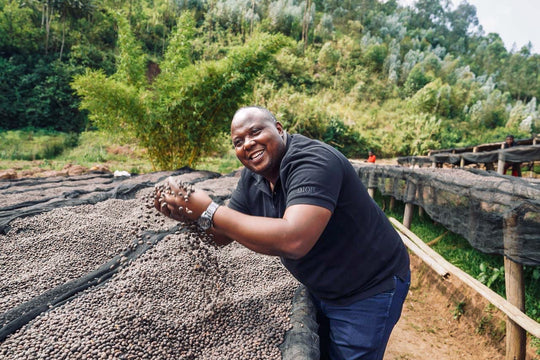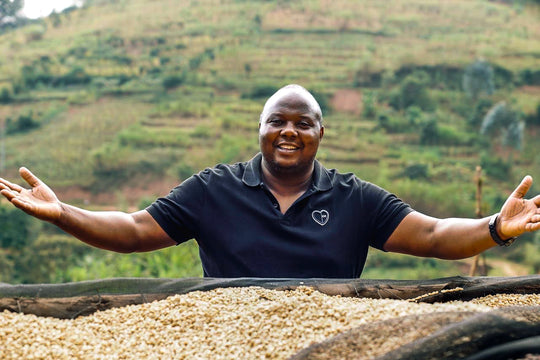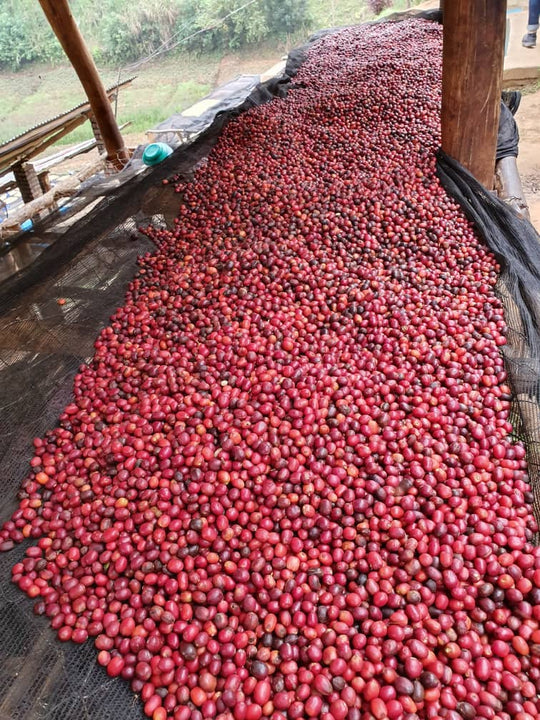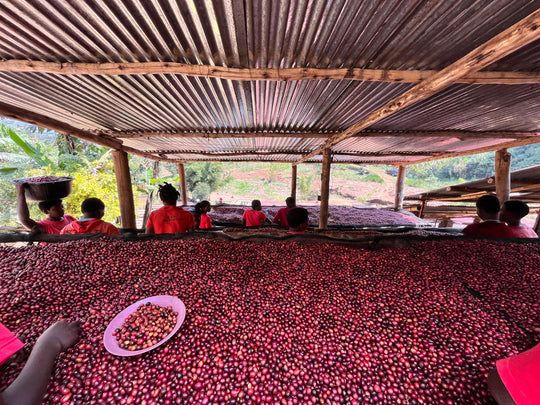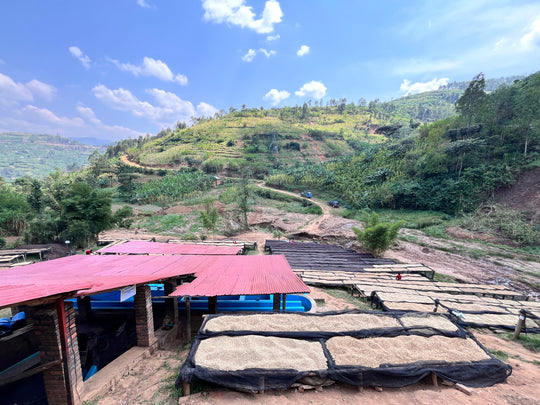012 - Emmanuel Rusatira
- Free U.S. shipping
2025 FREEZER SALE UPDATE (2025-12-17):
From Christopher: If I had to hazard a guess, I'd say this coffee was the sleeper of the season—a stunningly sweet, structured and clean washed Bourbon that captures the beauty of Rwandan coffee. What it lacked in florality or loud fruit tones it made up for in layers of sweetness. I hope that, through this re-release, which is somewhat lighter than the original release, it finds a new and appreciative audience.
The third coffee of our 2025 season comes to us through a collaboration with Emmanuel Rusatira of Baho in Rwanda and Sundog Trading. This microlot showcases how intentional processing and drying can produce a clean, articulate coffee that can hold up even to extended transit times.
From Christopher: "I'm enthusiastic about supporting young importing companies when I can, particularly when they've committed to marketing coffee from a particular producer or supply chain. This interest—coupled with my love for coffee from Rwanda—led me to begin buying from Ben Bowdoin and his company, Sundog Trading, in 2020.
"In the 1970s and 1980s, coffee played a central role in the economy of Rwanda and provided a living for hundreds of thousands of smallholder coffee farmers and their families. The industry collapsed, however, following the implosion of the International Coffee Agreement, which devastated prices, and the genocide that followed in the aftermath. Following the end of the genocide, coffee production took a central role in the economic and cultural reconstruction of Rwanda.
"One of the genocide's survivors, Emmanuel Rusatira, would go on to first manage washing stations for other exporters and then eventually found his own export company and washing stations—establishing his company with a mission of celebrating his joie de vivre and the perseverance of the Rwandan while promoting meaningful economic opportunity for his community.
"For Sundog's 2024-2025 import, I collaborated with Ben and Emmanuel, writing a series of processing and drying protocols to explore not only the cup impacts of controlled fermentation but also how slow, shaded drying could improve the durability of the green coffee over long transit times. This proved to be prescient—as transit delays kept the coffee afloat for three months longer than anticipated. Emannuel oversaw the processing himself, isolating cherry from growers at the highest elevations around Muzo hill.
"When this coffee arrived, I was delighted with how well it withstood its long journey, presenting in the cup with sweet notes of cherry cola, caramel and blood orange."
This coffee was roasted the week of April 14, 2025 and again on December 18, 2025.
TASTING NOTES: Cherry cola, caramel and blood orange
ROAST: Light, to accentuate the structured acidity of this coffee and present its fruited character as ripe and juicy
ACIDITY: Tangy-sweet, cola-like and structured acidity
FUNK: This is a clean fermented honey with tropical, cola-like sweetness and acidity and no perceptible pulpiness or funk.
FOR FANS OF: Cherry cola; year-over-year relationships; processing explorations
FARMGATE PRICE: 750 rwf/kg + 150 rwf/kg second payment
FOB PRICE: $6.00 per lb
LANDED PRICE: $7.00 per lb
In June 2023, the National Agricultural Export Development of Rwanda, the government body which oversees and regulates coffee production and export nationally, suspended the zoning policy that had been in effect since 2016. Under this policy, washing stations could only buy cherry that originated from within their designated zone. The purpose of this was to reduce overall competition for cherry, enabling smaller exporters with less liquidity to operate.
The deregulation of cherry purchasing introduced an additional layer of competition which drove prices higher and higher through the harvest. While the minimum price for cherry set by NAEB was 510 rwf, prices paid for cherry were, on average, 30-40% higher through the harvest as a result. While this meant that smallholders stood to gain more from their harvest, it also has a deleterious effect on quality—leading to cherry traveling greater distances and held for longer times to secure the highest price, while competition for collections meant an overall reduction in sorting and selection.
To ensure cherry was of the best-available quality, Emmanuel paid 750 rwf per kg, or 47% above NAEB's minimum price, and also paid a second payment of 150 rwf at export. In May 2024, the exchange rate between USD and RWF was approximately 1 USD = 1270 RWF. This means that, assuming standard yields and milling performance, the farmgate price paid to farmers contributing to this lot was $1.93 per lb at a time when the c-market price was still roughly $2.00 per lb.
While Emmanuel owns his washing station and export company, he financed the purchase of cherry as well as operating expenses through the harvest and does not own his own milling infrastructure, accounting for significant expenses. Further, because it is landlocked, coffee must be exported through Mombasa in Kenya or Dar es Salaam in Tanzania, increasing the cost of transportation and fuel relative to coastal nations.
The import margin taken by Sundog is small relative to other importers of its size and volume; this is intentional, to keep more of the value of the coffee at origin and allow Emmanuel to reinvest in Baho toward building infrastructure and capacity for future harvests, reducing reliance not only on third party service providers for milling but also for finance.
Red bourbon coffee grown above 2000 masl using organic methods by 650 smallholders around Muzo Hill in Gakenke District, Rwanda; processing was personally overseen by Emmanuel Rustira and the Muzo station manager, Theoneste Niyomugabo, using a protocol written by Christopher Feran in which coffee was selectively hand-picked at peak ripeness and collected May 4-6, 2024; sorted; floated; pulped; fermented under water for 48 hours in open plastic barrels; drained; dried as a honey under shade in for 25-30 days.
This coffee is roasted light to highlight its structured acidity while supporting its sweetness and body. I recommend resting it for at least 3 weeks from its roast date for filter brewing and 4-6 weeks for espresso-style preparation (though you may wish to try it earlier to enjoy how the coffee changes and opens over time).
As filter, I prefer a ratio of 1:17 using fast-extracting burrs and low-agitation methods of brewing resulting in 22-23% EY.


